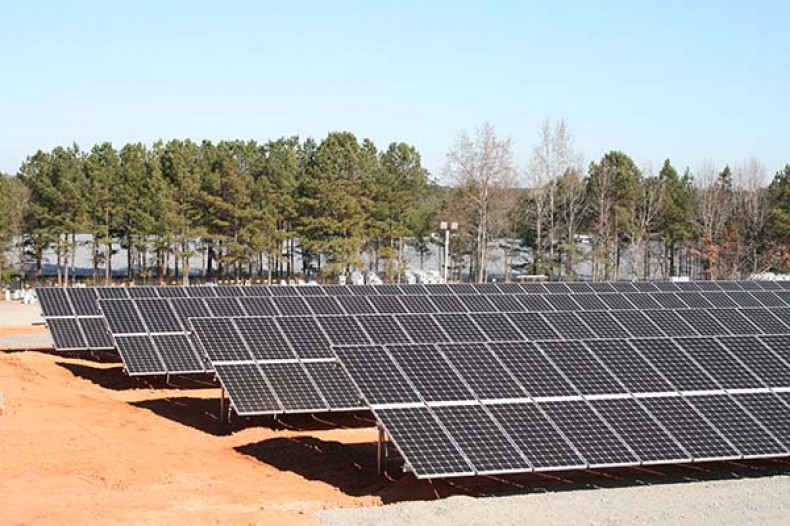Cooperatives respond to changes in the industry

Electric cooperatives are placing "community solar electric" installations in their service areas and invite members to invest in renewable energy sources by buying or leasing solar panels from the co-op and sharing in the savings it provides for all co-op members. This shows a Pee Dee EMC facility near its Wadesboro office.
Until recently, the business of providing electric service had not changed much since the 1930s and 1940s when electric cooperatives formed in North Carolina. Cooperatives have supplied electricity from plants they own or from wholesale power purchase agreements with generating utilities such as Duke Energy and Dominion Power. Co-ops have distributed that power to households, businesses and communities across a system of substations, wires and poles that the co-ops own and maintain. Since the early days, meters have measured the electricity members consume, and members have paid each month for the electricity they use.
Now, the business of producing, delivering and managing electricity is changing. An example that you can see in your own community are the houses or farm buildings generating electricity from solar collectors on their roofs. Another example is the automated meter you may have on your building that not only measures and reports the electricity you use, but also helps the co-op know when your power is interrupted and where the fault occurred. Other examples include options to pre-pay for your electricity, and services that help you monitor and control how much power you use day to day, even hour to hour.
In some other regions of the U.S., consumers can buy electricity from a number of providers competing for their business, including communication services, home security businesses, even home improvement retailers who install solar electric systems on houses and sell the power.
How are electric cooperatives responding?
Your electric cooperative has advantages for doing business in this changing market: cooperatives are local, member-focused, not-for-profit, and flexible. The board of directors elected by co-op members is composed of people who live, work and do business in the local communities, which is why co-ops naturally help members to improve their quality of life. An electric cooperative's primary purpose is to deliver electricity that is reliable, safe and affordable, so a co-op can focus on the best ways to do that:
1. Understanding your expectations for excellent service.
You expect your electric cooperative to keep the power on every minute of every day, for your lights, hot water, heating and cooling, appliances, cell phones, computers. This is your co-op's main focus.
2. Helping to manage your energy costs.
As a trusted energy advisor, your cooperative helps you understand how you use electricity and what you can do to keep your bills as low as possible. This includes advice for finding efficient appliances, monitoring your usage, preventing energy waste, budgeting your payments, etc.
3. Welcoming innovation.
Cooperatives are known for studying trends in the power industry and adopting technology and business practices that make sense for their members. Among North Carolina's utilities, cooperatives lead the way in introducing automated metering and outage response systems, implementing efficiency in all aspects of the business, adding sensible renewable energy sources to their power supply, and offering online energy management systems, account information and payment options.
As the electricity industry world turns, cooperatives keep up with trends by maintaining their member focus, embracing innovation and staying flexible.
4. Keeping members involved.
As a service business owned by its members, a cooperative by nature responds to members. Community meetings, information exchange, regular communication, annual elections — they have always been part of how co-ops do business. Communication and involvement is even more important as the business evolves.
5. Caring for communities.
Your co-op was formed by its communities, so its loyalty is to your communities: local education, business development, environmental stewardship, support for all levels of society.
6. Restoring your power.
When outages do occur — from major storms or minor interruptions — cooperatives kick into gear and get the lights back on sooner than any other electric utility can do it.
-
Share this story:



